Iranian Projectiles Destined For Israel Discovered Across Iraq
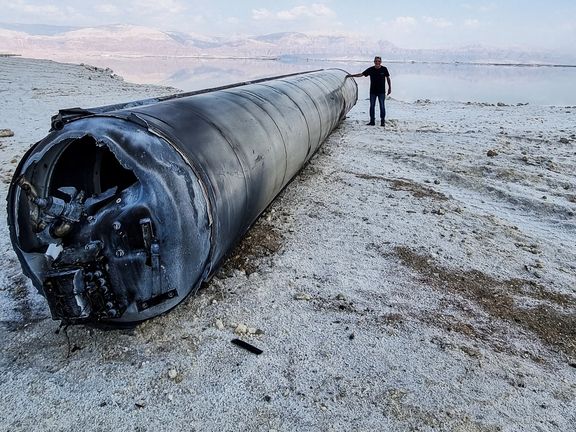
Wreckage from Iranian missiles and drones destined for Israel has been discovered across Iraq following Saturday night’s foiled bombardment.

Wreckage from Iranian missiles and drones destined for Israel has been discovered across Iraq following Saturday night’s foiled bombardment.
Over the weekend, US-led coalition forces in Iraq successfully intercepted dozens of the projectiles, a source close to the Iraqi government told The National.
The majority of the Iranian drones and missiles were shot down above key areas including Baghdad, Najaf, and the semi-autonomous Kurdish region in northern Iraq.
US anti-missile systems stationed at the Ain Al Asad airbase in Anbar province were pivotal in neutralizing the airborne threats. Additionally, a US Patriot battery in the Kurdish region intercepted at least one ballistic missile, which subsequently crashed in the Soran district near Erbil.
Following the attack, which involved more than 300 drones and missiles launched by Iran towards Israeli territory, the Iraqi landscape was littered with remnants of the intercepted weapons. Notably, parts of a drone were found in an open area outside Najaf. No casualties have been reported from the incident, another official said.
Along with the US, Israel was aided by the UK, Jordan and France in the mission to intercept the barrage.
The Iranian offensive came in retaliation to an Israeli airstrike on April 1 on Tehran's consulate building in Damascus, which resulted in the death of two high-ranking Iranian military officials plus other IRGC personnel.
Despite the chaotic aftermath, the Iraqi government has yet to issue a formal denunciation of Iran’s use of its airspace for the attacks.
A spokesman for the Iran-backed Al Nujaba militia in Iraq criticised Baghdad after the attack, saying the intervention of US forces "undoubtedly embarrasses the Iraqi government, which seeks to take a clear position on the American military presence" in the country.
The US Central Command said it “successfully engaged and destroyed” more than 80 one-way attack drones and at least six ballistic missiles intended to strike Israel from Iran and Yemen. It was the first direct attack from Iranian soil to target the Jewish state after years of shadow warfare.
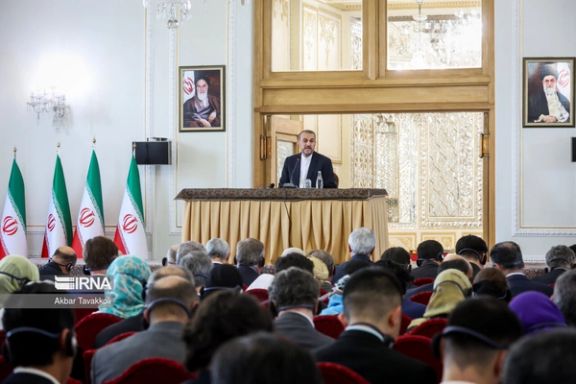
A Republican Senator is pressing the Secretary of State to "immediately revoke" the visa issued to Iran's Foreign Minister ahead of his trip to a UN meeting in New York this Thursday.
“After Iran attacked an ally of the US it would be absurd for the State Department to allow Iranian Foreign Minister a visa to travel in the US,” Senator James Lankford's wrote on X.
Iran's UN mission confirmed that Hossein Amir-Abdollahian will represent Iran at a UN Security Council meeting on Israel's Gaza war this week.
Amir-Abdollahian has visited the US twice since attacks carried out by terrorist group Hamas – part of Tehran's proxy network – on Israel.
“Given his ties to terrorism against Israel and US forces, Amir-Abdollahian should not be welcome in our country,” read Republican Senator James Lankford's letter addressed to US Secretary Antony Blinken.
Following Iran's unprecedented attack on Israel this past Sunday, the Iranian government official’s visit comes at a time of unparalleled tensions between Tehran and Tel Aviv.
Iran’s armed forces launched over 300 drones and missiles in response to purported Israeli attacks in Syria which killed several Islamic Revolutionary Guard Corps officials.
The visit also coincides with the 41st anniversary of the 1983 bombing of the US Embassy in Beirut, carried out by the Islamist terrorist group Hezbollah, with support from Iran. That attack killed 63 people.
Last month, a group of 27 House Representatives penned a letter to the State Department, urging the Biden administration to ban Iranian officials from attending UN meetings in the US.
The US is generally required to allow foreign diplomats access to the United Nations under the 1947 "headquarters agreement" – though Washington can refuse visas for reasons related to security, terrorism, and foreign policy.
In 2020, after then-President Donald Trump ordered the killing of prominent military commander, Qassem Soleimani, Iranian Foreign Minister Mohammad Javad Zarif was denied a visa to attend a UN Security Council meeting in New York.
The Biden administration has been under pressure for not taking a firmer stance against Iran’s aggression from lawmakers and US allies – all against the backdrop of the upcoming presidential election.
“Hamas, Hezbollah, Palestinian Islamic Jihad and the Houthis are all currently attacking our ally Israel with weapons supplied by Iran. The Biden Admin can and should stop the Iranian foreign minister’s entry into the US,” Senator Lankford wrote on X.
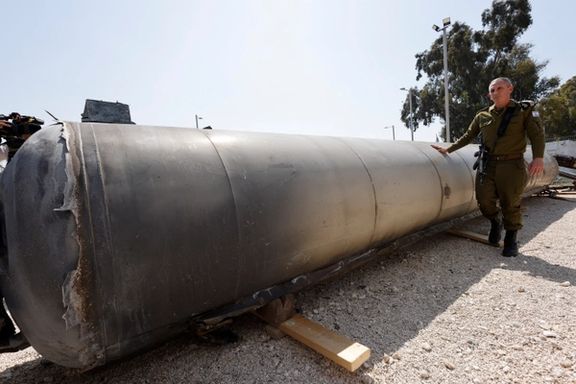
Iranian government and military officials are doubling-down on their narrative that Sunday’s attack on Israel was a great success.
The Islamic Revolutionary Guards (IRGC) launched 170 drones, more than 30 cruise missiles and more than 120 ballistic missiles – 99% of which were intercepted by Israel and its allies.
In the days since the unprecedented attack, several politicians have spoken out in support of the military action against Tel Aviv.
That included Esmail Kosari, a parliamentarian who sits on the National Security Committee, who justified the operation and framed it as a "legitimate defense against Israel”.
“The news, information, and documentation of the amount of damage we caused to Israel will be made known to the people so that the people of Iran will be informed about the details of the relevant information," Kosari said.
Israel has reported that damages sustained by the attack were limited to minor damage of its air base in Nevatim.
Reports also suggest that a 7-year-old girl from a Bedouin community in Israel suffered a head injury, potentially due to shrapnel from an intercepted ballistic missile falling directly on her home.
Support for Tehran’s military operation also came from so-called reformist journalists, one of whom warned against “internal dissent” and echoed the IRGC’s narrative of the event, criticizing those who dispute the effectiveness of the operation.
“Unfortunately, some inside the country have become defenders of the devil…they promote and reproduce 99 percent of the Israeli narrative,” Mashallah Shamsolvaezin said.
Threats Of Harsher Retaliation
The rhetoric from Iranian officials also included warnings directed at Israel and the United States.
The government’s parliamentary speaker, Mohammad Bagher Ghalibaf, warned Israel of "harsher responses".
Meanwhile, the Army’s Commander-in-Chief Abdolrahim Mousavi, threatened heavier retaliation “if Israel persists in its actions”.
Mousavi also threatened Washington to steer clear from using its bases in any retaliation, saying that "they will be considered operational targets and will be targeted".
The Supreme Leader Ali Khamenei's representative in the northwestern province of Khorasan, reinforced these warnings by invoking the possibility of devastating retaliatory measures.
Other Iranian figures such as Sadegh Amoli Larijani, Chairman of the Islamic Republic’s Expediency Council, and Iraj Masjidi, a senior adviser to the commander of the IRGC, insisted on the “failure of Israeli defenses” to deter Iranian missiles, boasting Iran's confidence in its military capabilities.
Parliamentarian Jalil Rahimi Jahanabadi, another member of the National Security Committee, further claimed that "in order to achieve peace, one must stand against the tyrant and the aggressor."
Mahmoud Abbaszadeh Meshkini, another parliamentarian, dismissed Israel's capabilities in fighting against the Islamic Republic saying that Israel is not capable of doing anything against Iran’s national interests.
“They just pretended to fight back," he said.
"I think it is unlikely that Israel will hit our civilian sites, not even our military sites," said parliamentarian Abbas Golrou.
Golrou also expressed skepticism about an all-out war with Israel – suggesting that neither Iran nor the US desire that kind of conflict.

US Treasury Secretary Janet Yellen on Tuesday said Iran's attack on Israel last weekend and its financing of militant groups threatened stability in the Middle East and could cause economic spillovers.
Yellen began remarks prepared for a news conference by addressing what she called an unprecedented attack on Israel by Iran and its proxies, saying Treasury would use its sanctions authority and work with allies to "continue disrupting the Iranian regime’s malign and destabilizing activity."
The United States is using financial sanctions to isolate Iran and disrupt its ability to fund proxy groups and support Russia's war in Ukraine, the Treasury Department said. However, critics says the administration is not enforcing some key sanctions, providing Iran with a partial reprieve.
Treasury has targeted more than 500 individuals and entities connected to terrorism and terrorist financing by the Iranian regime and its proxies since the start of the Biden administration in January 2021, Yellen said.
That has included targeting Iran’s drone and missile programs and its financing of the Palestinian militant group Hamas, the Houthis in Yemen, Hezbollah in Lebanon, and Iraqi militia groups, she said.
"From this weekend’s attack to the Houthi attacks in the Red Sea, Iran’s actions threaten the region’s stability and could cause economic spillovers," Yellen said, without giving details.
She spoke at a news conference during this week's meetings of the International Monetary Fund and World Bank, which bring top finance officials to Washington from around the world.
The Biden administration continues the policy of the Trump administration in sanctioning companies and individuals involved in Iran’s destabilizing activities and weapons programs. However, since President Biden took office in early 2021, enforcement of Trump’s oil export sanctions on Iran have become weak, as the administration has sought to revive the JCPOA nuclear accord. Moreover, Biden has offered sanctions waivers to Iran totaling at least $16 billion in 2023.
When asked about Iran's continuing oil exports despite US sanctions, Yellen replied, "We have been working to diminish Iran's ability to export oil...There may be more that we can do."
Iran on Saturday launched more than 300 drones and missiles against Israel, its first direct attack on the country, in retaliation for a suspected Israeli air strike on its embassy compound in Damascus on April 1 killed elite military officers.
Israel's military said that it shot down almost all the drones and missiles, and that the attack caused no deaths, but the situation has increased fears of open warfare between the longtime foes.
In Gaza, thousands of Palestinians have been killed in the Israeli offensive launched against Hamas after the group attacked Israel on Oct. 7, killing 1,200 people and taking 253 hostages, according to Israeli tallies.
Yellen said Washington was continuing to use economic tools to pressure Hamas, but said Treasury was emphasizing that its sanctions should not impede life-saving aid.
She called for urgent action to end Palestinian suffering in the narrow enclave, noting that Gaza's entire population of more than 2 million people was facing acute food insecurity and that most of the population had been displaced.
"It is incumbent on all of us here at these meetings to do everything in our power to end this suffering," she said.
Yellen noted that Washington was also using sanctions to target extreme settler violence in the West Bank, while working to ensure a functioning banking system there and supporting IMF programs in Jordan and Egypt.
With reporting by Reuters
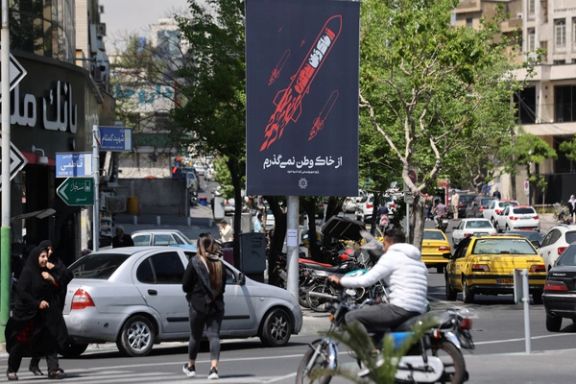
For the last 45 years, Iranians have resorted to using humor as a crutch in coping with the country’s various challenges – including the aftermath of the Islamic Revolution, ongoing economic struggles, and the nuclear crisis.
In Iranian society – where there is no freedom of speech, media, or assembly – humor and political jokes are often used as a vital form of resistance, to make sense of hardships and provide momentary relief to forget one’s daily struggles.
Of course, this phenomenon has a history in other totalitarian regimes, like the Soviet Union. During the Soviet period, political jokes served as a form of social protest, mocking and criticizing leaders, the system, its ideology, myths, and routines.
Iranian political satire dates back to the Constitutional Movement era. The critical works of Ali Akbar Dehkhoda and Ashrafuddin Gilani, along with critical magazines such as Tolou’-e Mosavvar, Adab, Kashkool, and Azerbaijan, constitute a significant heritage in contemporary Iranian literature. Political satire flourished in the works of writers such as Gholamhossein Saedi, Jalal Ale-Ahmad, Bahram Sadeghi, and Javad Mojabi in the 1960s and 1970s and Towfeeq Magazine in the 1920s to 1960s. Being acquainted with this tradition, Iranians from all walks of life know the effectiveness of this genre and take part in producing sarcasm, parody, and scorn.
Before social media and smartphones, Iranians used to crack political jokes in taxis, barber shops, public baths, and coffee shops to ridicule the Islamist regime’s policies and officials.
Now, with 60 million smartphones in their hands, Iranians are busy entertaining each other online. Immediately after the news of the IRGC missile and drone attacks on Israel, jokes were circulated all over the country: the number of jokes were limitless.
The jokes mocked the Iranian military action so effectively that it prompted the state-owned TV stations to try to retaliate – though their jokes came across as flat and unassuming. The IRGC’s Intelligence Unit and the judiciary also made threats to prosecute anyone who ridiculed and criticized the military establishment.
Here is a sample of these jokes in Persian and English. Iranians began making fun of what happened in the early hours of April 13th, 2024 – with nothing beyond their colorful imaginations.
“By God (or frankly), if they had thrown cucumbers, the casualties would have been higher.”
A sarcastic remark about the ineffectiveness of the IRGC missiles used in the attack – suggesting that even something as harmless as cucumbers could have been more damaging.
“Addressed to the ruling clerics: ‘If you had thrown your diapers, at least Israel would have been busy cleaning up’."
The reference of diapers here, likely a sarcastic reference to the age of many of the Shiite clerics ruling Iran.
"If Iran would have donated free ‘Pride’ cars to Israel instead of these drones and missiles, it would have cost less and caused more damage."
A humorous critique suggesting that Iran’s domestic car brand, Pride, known for its poor quality – would have been more problematic for Israel than the attack. Thereby, making the donation of Pride cars, being both cheaper and more effective in causing a disruption for Israel.
"Erbil, Ilam, and Kermanshah were in the path of these flying water heaters. Why the properties in Shiraz and Mamasani?"
Calling the missiles and drones "flying water heaters", the joke pokes fun at the fact that the Iranian attack hit cities that were not on the flight path – like Shiraz and Mamasani.
"The missiles launched by the Islamic Republic towards Israel enjoyed the journey more. The destination wasn't important."
The joke suggests that the missiles were more concerned with their flight than actually reaching their intended target, emphasizing their ineffectiveness or the lack of impact they had upon arrival.
"The sound of this truck's exhaust you hear is actually the engine of a Revolutionary Guards' drone secretly flying from Iraq towards Israel, and it will arrive there in another seven hours. All this secrecy wasn't necessary, brave one."
The use of the word “brave one” in this joke references the fact that Israel was aware of Iran’s unfolding attack for hours – rendering any supposed “bravery” of the operation futile or even comical.
"They would have arrived sooner if they had taken Snapp."
"Snapp" refers to a popular ride-hailing app in Iran, similar to Uber. The joke suggests that if the Iranian forces had used a commercial ride-sharing service for drones, similar to calling a taxi, their mission wouldn’t have taken so long to execute.
The drones must have stopped somewhere to pray; otherwise, they shouldn't have taken this long."
Iranian society has undergone mass secularization in recent years. The sarcastic remark of stopping for prayer pokes fun at the Islamic Republic’s ideology – often a point of ridicule for many Iranians who don’t align with the regime’s Islamist point of view. Iranian bus companies make scheduled stops for passengers to pray during long trips.
“Now that the drone is stuck in the electric wire, hope its technology will not get in the hands of the enemy.”
Underlining the drone’s ineffectiveness, the remark sarcastically implying the minimal value or sophistication of the technology – should it fall into enemy hands.
“We created a fun Chaharshanbe Suri for them. Special thanks to the Sepah and the Iron Dome for creating this exciting night."
Chaharshanbe Suri is an Iranian festival celebrated on the last Wednesday before the Persian New Year (Norouz), involving fireworks and bonfires, symbolizing the warding off of evil spirits. The sentence sarcastically compares the attacks to the festival's fireworks, likely a reference to the fact that the Iron Dome intercepted 99% of the Iranian missiles/drones.
“The word ‘Pahpad’ is very chic. We should call the drones ‘Pahnemat’ instead.”
The word ‘pahpad’ in Persian means drone. The satirical term, ‘pahnemat’ is a way to suggest that the drones sent by the IRGC are as insignificant or useless as dog excrement.
“We have told everyone that we hit them. You should do the same. It makes no difference.”
The phrase, written in a thuggish tone, humorously suggests that despite the attack's failure, the authorities are insisting on claiming success and encouraging others to affirm this claim, regardless of the truth.
"- Did the missiles not arrive?
- No. They're still stuck in tunnel number 3.
- Or perhaps they've been demolished by the Darreshahr Iron Dome.”
In this case, the Darreshahr Iron Dome is an imaginary defense system – poking fun at the length of time it took for the Iranian attack to be carried out and drawing a parallel to the sophisticated Iron Dome in Israel.
"Addressing the drones: Go with your lights off; they won't hit you."
This joke suggests that turning off the lights on the drones may prevent them from being detected or targeted by Israel’s defense systems – with a sarcastic attitude towards the effectiveness of the drones.
“We are not from Kufa for Bibi to be left alone.”
This joke draws a parallel to a historical event in Islamic history where people from Kufa in Iraq, betrayed Ali (the first Shia Imam) resulting in his martyrdom. Typically, regime supporters use the phrase suggesting that they will not leave Ali alone. In this context, “Bibi” is Israeli Prime Minister Benjamin Netanyahu – and it's a sarcastic way of showing support for Israel – instead of the Iranian regime.
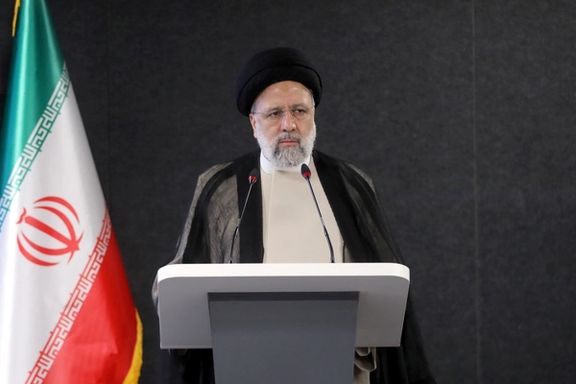
Iran’s president has threatened Israel with a “severe, extensive and devastating” response to further military actions after Israel’s army chief stated plans to retaliate to Saturday night’s bombardment.
The threat by Iran’s President Ebrahim Raisi follows the launch of over 300 missiles and drones by Iran towards Israeli territory, Iran’s first open assault against its main enemy state.
The bombardment was in retaliation for an Israeli air strike on the Iranian consulate building in Damascus on April 1, killing two senior Quds Force commanders and other IRGC personnel.
Raisi made the statement during a phone call with Qatar’s Emir, Sheikh Tamim bin Hamad Al Thani Monday night.
"We firmly declare that the slightest action against Iran's interests will definitely be met with a severe, extensive and painful response."
Adding to the tensions, Israeli Lieutenant General Herzi Halevi vowed retaliation during a statement to troops at the Nevatim air base, one of the sites hit in the Saturday attack.
Further complicating matters, Iranian Deputy Foreign Minister Ali Bagheri Kani warned that Iran would react instantly to any Israeli counterstrikes.
“The retaliation would come in a matter of seconds, as Iran will not wait for another 12 days to respond," he told state TV.
The situation has also aroused international concern. US Secretary of the Treasury Janet Yellen stated that Iran threatened stability in the Middle East and could cause economic spillovers.
She said the US would use sanctions and work with allies, to keep disrupting Iran’s "malign and destabilizing activity."






